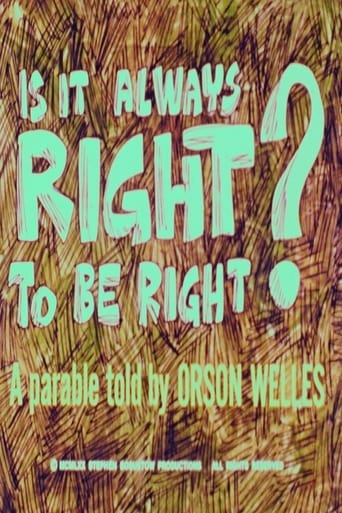The world is divided into factions, on opposite sides of issues; each side is, of course, right. And so the gap between the people grows, until someone challenges the absolutist view of what's "right."


Reviews
It's a brief and penetrating parable about a land in which people thought they must be "right" and to admit otherwise was a sign of weakness. Nobody said, "You might be right." Nobody said, "I could be wrong." The population was divided on many issues and the gulf between them grew.This won an Academy Award in 1970 and the groups described now look a little dusty with age -- doves and hawks, young and old. But the moral remains the same, though the self-righteous groups are now different.The message is that we have to overcome our sense of certainty and build bridges across those gulfs to find common ground. It's easier said than done because building a bridge between two antagonistic groups requires at least two heroes, one on each side of the chasm. The heroes must not only appeal to the group across the gulf, who are likely to throw rotten fruit at them because they are "enemies." The heroes must also brave the insults of the group they BELONG to, because they'll be scorned as traitors to the cause or the race.The issue is tied to the concept of manliness. If an armed man approached Clint Eastwood and ordered him to get out of town, would Clint Eastwood reply, "Can't we sit down and talk this over before one of us gets hurt?" No. No, he wouldn't. Neither would John Wayne. That concept of masculinity is a little limited. Japanese kamikaze pilots left little dolls and haiku behind for their loved ones. On the night before a battle, Greek generals would discuss philosophy and write poems. Any warrior doing that today would have one foot in fairydom.Those gulfs look wider today that they did forty-five years ago and not much seems to have changed. During his campaign, one man said, "I'm not going to change my mind because it's made up, and I'm not the kind of guy who changes his mind once it's made up." We liked that so much we elected him president.It's a conundrum and possibly there is no solution. Of course I may be wrong.
Lee Mishkin's Oscar-winning "Is It Always Right to Be Right?" looks partly at the generation gap of the 1960s but more generally at polarization in general: both sides are so convinced of their rectitude that society suffers stagnation. Sound familiar? Narrated by Orson Welles, the cartoon makes the point that both sides have legitimate arguments. The setting never gets identified but it's clearly the US, with the adults emphasizing the high quality of life and the young people emphasizing the prominence of racism and militarism. All very important points.This cartoon reminds us that not only do cartoons not have to be "cute" (animation is simply another type of filmmaking), but it's one of the best ways to draw attention to society's problems. I definitely recommend it.
Just watched this Steve Bosustow Productions animated short on YouTube as linked from Cartoon Brew. It was the last one to win an Oscar for "Short Subject, Cartoon" before the category was changed to "Short Subject, Animated". Narrated by Orson Welles, Is It Always Right to Be Right? addressed the polarizing views of the nation as they were divided over the Vietnam War, Nixon's election, and the world in general. Mixed with limited animation and live-action footage, this short is relevant even today with the divisiveness of the recent presidential election. So on that note, I highly recommend Is It Always Right to Be Right?
For some time now, it has been a self-imposed policy not to comment on things I don't have a copy of, but I'm breaking that here because I don't want this one to go unregarded any longer. I've seen this twice, the first time almost thirty years ago and it burned its way into my brain then and has stayed there.A blend of still photography and very limited animation, it looks and feels like the old UPA cartoons from the 1950s, which is understandable, because the producer of this, Nick Bosustow, is the son of Steve Bosustow, who produced the UPA shorts. In order for limited animation to work, there has to be something that hooks the audience. That something is the narration, and boy, does it work! The voice of Orson Welles is perfect for this, as are the script and the visuals. Everything blends together perfectly to create a memorable and totally riveting experience. That this is not in circulation through syndication or by being in print and generally available disappoints me more than I can say. When you look through history, you find that a great deal of damage has been done by people who are thoroughly and totally convinced that they are RIGHT and everyone else is WRONG, mostly about things theological. This cartoon questions that unshakeable belief people have about (fill in the blank) and does so beautifully. I cannot recommend this more highly. If you ever get to see this, by all means, do so!


